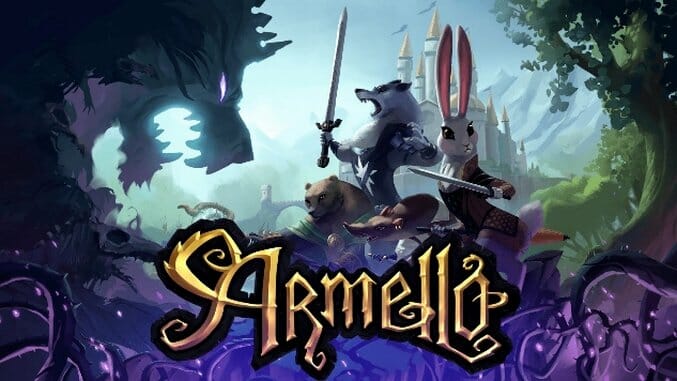
Armello is one of the most visually charming games I’ve ever seen. It presents a medieval, animal world with various factions with different powers and relations to their lush world. There are wolves, rats, bears, and rabbits, and each of those species is a particular manifestation of the different qualities that those animals can represent in the weird, wild world of symbology. The rats are sneaky! The wolves are warriors! The bears are strong! The rabbits… rabbits. It’s a beautifully complete conceptual package from design to implementation, and it forms the core of a very complex board game that spirals out from that point.
Sadly—and I literally mean that it makes me sad, that it hurts my feelings to have to say this—that strong core concept of animal factions with characters who do things just does not gel with the rest of the digital board game that is Armello.
The general conceit of the game is that the various animals and their factions are competing to usurp the dying king of the realm. The king is infected with The Rot, a fantasy disease that makes one both decay and go mad, and there are several win conditions that are dependent on the king, his Rot, and the players themselves. One could fight the king and take the throne. One can wait for the king to die and ascend to the throne based on political prestige. One can cure the king. To get to any of these victory conditions, one needs to race other players who are trying to accomplish their own (opaque to you) goals.
The board is hex-based and your moves are limited by the number of action points you have. The way you move, and what your optimal moves could be, is based on your faction and character. You also have cards that can deliver positive, negative, or value-neutral effects to other players or yourself. The Rot system interacts with all of this, limiting your moves and your health in ways that can either help you press an advantage or keep you from getting very far. And, of course, there’s a complex dice-based combat system. All of these different systems use different resources like gold or spirit. They are also dependent on buildable-stats like Wits and Body.

You’re not wrong to think that all sounds confusing. In playing several long games of Armello (each game takes about an hour), I had to repeatedly look up what the various interactions of different stats, resources, and cards might be. The game is probably more simplified than your average Euro-style board game, but it certainly doesn’t feel more simple. Trying to figure out the best play of any given hand in a particular board state takes quite a bit longer than I would prefer, and even then an optimal play doesn’t ever really feel ‘optimal’. Instead, it just feels like I’m barely keeping up. Armello puts you into a cruel world.
Armello is pitched as a complex digital board game, and it certainly is that. Across single and multiplayer experiences, I found the very act of playing Armello to be slower, more confusing, and less dynamic than a physical board game, and even playing with a friend using voice chat didn’t translate the charm of playing a really good board game with a group of friends.

I couldn’t quite figure out why I felt this way when playing, but after taking a few days out of the experience, I’ve come to the conclusion that Armello’s complexity just isn’t served by its digital presentation. The things that a being a videogame adds to the experience is just not additive enough, and in some cases it actively detracts from the experience (like when a bird screech or a lion’s roar is 200% higher in the sound mix than anything else). Waiting for someone else to take their turn in a physical board game can be alleviated by all kinds of distractions, table talk, and bathroom breaks. Armello demands a solid fixation that actively eliminates all of those compensation devices, leaving me watching an AI scamper around, at best, or waiting for a stealthed enemy to finish their turn in secrecy, at worst.
I believe that Armello has many of the pieces of an amazing game, but those pieces don’t quite fit together just yet. I think that the development team, if given the chance, could iterate on this design to hit a perfect mix of computer mediation and boardgame excitement. While Armello misses the mark for me, I look forward to whatever they cook up next.
Armello is the first game to be developed and published by League of Geeks. It is available for Windows, Mac, and Linux, as well as PlayStation 4, iOS, and Android.
Cameron Kunzelman tweets at @ckunzelman and writes about games at thiscageisworms.com. His latest game, Epanalepsis, was released on May 21. It’s available on Steam.